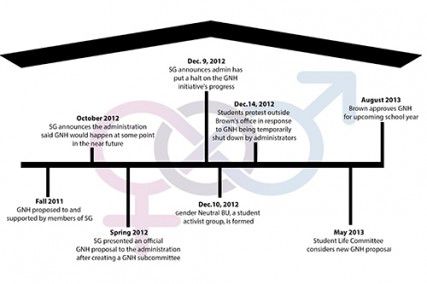
Gender-neutral housing, starting during the fall 2013 semester, will officially be an option for Boston University students, said BU spokesman Colin Riley.
After several years of discussion between the student body and administrators, BU President Robert Brown passed the gender-neutral housing option Tuesday with some limitations, Riley said.
“People who choose this [the gender-neutral selection process] will have some additional requirements to fulfill, as they would need everyone [who they are living with] to approve,” Riley said.
While gender-neutral housing has officially been approved, it will only be available in certain locations. West Campus, The Towers, Myles Annex and Warren Towers are not included in the new gender-neutral housing program as they are large dormitories with communal bathrooms, Riley said.
Additionally, Riley explained since freshman are part of the university housing system for the first time and are randomly assigned to a dormitory, they are not applicable to gender-neutral housing in their first year.
“Housing is designed to facilitate strong academic achievement, and an academic environment in which studying, research and personal development will take place,” Riley said. “It [Gender-neutral housing] may just provide one additional option to achieve that.”
An ongoing process for many years, the initiative has had its ups and downs. Students protested outside of Brown’s office after BU administrators halted the progress of the gender-neutral housing initiative during the fall 2012 semester and created an activist group called Gender Neutral BU to show continued support for the initiative.
School of Management senior Caitlin Seele, who is also a member of SG, was instrumental in drafting the original proposal for gender-neutral housing three years ago. She researched how other schools implemented gender-neutral housing, as well as authored the proposal and submitted it to administration. “Over the course of college I have made a lot of friends who think it [gender-neutral housing] would have make their college experience a lot better,” Seele said. “Every student has the right to feel safe and happy living on campus.”
While Seele said BU officials have always been sensitive to special housing cases, she also said it is wrong that students had to explain in detail why they were unhappy with certain living situations.
“This new proposal will force that sensitivity factor [by the University] and won’t ask too many personal questions,” Seele said. “They [a student] shouldn’t have to describe such a situation that can be uncomfortable for many.”
Seele said getting this proposal approved was a long and arduous process, with many logistical issues from a housing standpoint. She also said communication between students and administrators was not always efficient.
However, Brown’s decision marks a huge win for students who have supported the initiative, said BU Center for Gender, Sexuality and Activism member Swanson Ninan.
Ninan said gender-neutral housing is something students will surely want to take advantage of, but he wishes the incoming class of 2017 could benefit from the new changes right away.
“It is important to recognize that freshman are just as big a community as any other students on our campus,” Ninan, a College of Arts and Sciences junior, said. “Leaving them out is not the best, especially because sometimes they are the people who need it the most when they are getting acclimated to a new setting.”
Ninan said the student group Gender Neutral BU, created last semester to urge administrators to consider gender-neutral housing as an option, will continue its efforts to further the housing changes to include bathrooms and large-style dormitories.Student Body President Dexter McCoy said there has been an outcry among students for gender-neutral housing for some time now, as made evident by the student body response to a spring 2012 Student Government survey.
Overall, McCoy said SG is satisfied that the new housing change will continue to ensure that students who want to take advantage of gender-neutral housing will have the ability to do so.
“This is something positive to ensure that generations of Terriers to come will live in a safer and more comfortable living environment,” McCoy said.


















































































































